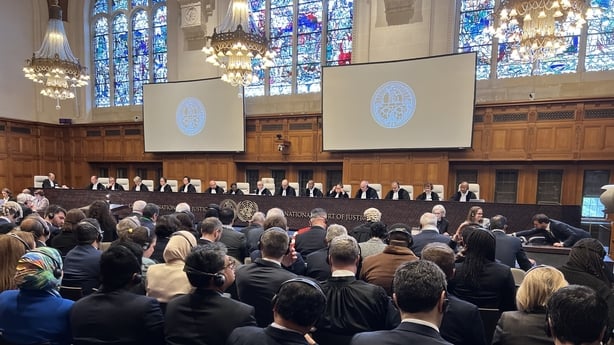Tánaiste and Minister for Foreign Affairs Micheál Martin has announced that Ireland will intervene in the case initiated by South Africa against Israel under the Genocide Convention at the International Court of Justice.
In a statement this afternoon, the Tánaiste said he had directed officials to start work on a Declaration of Intervention under Article 63 of the Statute of the International Court of Justice.
If approved by the Government, this will be filed at the court in The Hague for the case against Israel under the 1948 Genocide Convention.
It is not clear yet what points of law Ireland will reply upon for its intervention.
Last December, South Africa instituted proceedings at the ICJ claiming Israel had violated obligations under the 1948 Convention on the Prevention and Punishment of the Crime of Genocide during military operations following the 7 October Hamas attacks.
South Africa also asked the court to order provisional measures including an immediate suspension of military operations in Gaza.
On 26 January, the court ordered a number of provisional measures, directing Israel to ensure its military does not commit any genocidal acts and to enable the provision of urgently needed basic services and humanitarian assistance.
The Government has been under sustained pressure from the opposition to intervene in the case.
"As I said in the Dáil last month, intervention as a third party in a case before the International Court of Justice is a complex matter and is relatively rare," Mr Martin said in his statement.
"Since 1948, only four other interstate cases have been initiated under the Genocide Convention before the International Court of Justice.
"Ireland intervened in one of these – the Ukraine v Russia case – and, after a rigorous and comprehensive process of analysis and consultation over the last six weeks, we have determined that we will do so again in the South Africa v Israel case."
Mr Martin said that while it was for the court to decide whether genocide was being committed, what happened on 7 October in Israel, and what is happening now in Gaza, represents a "blatant violation of international humanitarian law on a mass scale".
He said the view of the international community was clear - that enough is enough.
"The UN Security Council has demanded an immediate ceasefire, the unconditional release of hostages and the lifting of all barriers to the provision of humanitarian assistance at scale. The European Council has echoed this call," the Tánaiste said.
"The situation could not be more stark; half the population of Gaza face imminent famine and 100% of the population face acute food insecurity.
"As the UN Secretary General said as he inspected long lines of blocked relief trucks waiting to enter Gaza during his visit to Rafah at the weekend; 'it is time to truly flood Gaza with life-saving aid. The choice is clear: surge or starvation’. I echo his words today."
Mr Martin had previously said that an intervention would be strongly considered by Government, but he had argued that detailed legal analysis was needed.
Earlier this week, the Tánaiste called Israel's announcement it would block all UNRWA aid to the north of Gaza as completely unacceptable.

Read more: South Africa's genocide case against Israel explained
'Important development, maybe overdue'
A former UN Special Rapporteur on Human Rights has said Ireland's decision to intervene is "maybe overdue" but is an "important development".
Fionnuala Ní Aoláin, who is a law professor at Queen’s University Belfast, said it is welcome that Ireland is "lending its strong voice" to the case in The Hague.
Speaking on RTÉ’s Drivetime: "I think it’s an important development, maybe an overdue development given a couple of weeks ago we saw tens of states lining up to make intervention, given Ireland’s notable, strong and consistent statements on the situation in Gaza, I think their absence was noticed.
"So I think it does remedy a kind of an obvious place where Ireland should be, lending its strong voice and so it’s welcome, it’s important.
"It continues to stress the extent of which many states including Ireland are deeply concerned about what’s happening in Gaza and affirmed the centrality of this court’s judicial decision-making on the question of genocide."
Prof Ní Aoláín explained that in an intervention, a country is not taking one side or the other as it is not a criminal proceeding.
However, it means a country is expressing a view on the density or accuracy of the facts being put forward by both parties or one party.
"One of the clear questions is, does this court have the right to allow a state which is not a party to this conflict, namely South Africa, to defend the principal of prevention of genocide," she said.
"It seems critically important that Ireland as a state that advances the obligation of many states to implement their human rights obligations actually affirms that the jurisdictional basis for this case, the obligation of all states, is affirmed and sustained by the court.
"The second point that Ireland has a really important role to play, and speaking to the standards of what constitutes a crime of genocide."
Prof Ní Aoláin added: "Most importantly, Ireland has an important role to play in saying , the provisional measures that this court has already authorised must be implemented.
"Practically what that means, the court has said it, humanitarian aid must get into Gaza.
"It seems obvious that the only way to implement those provisional orders is to actually have a ceasefire.
"So Ireland can lend its voice to that current, relevant, practical call to implement the provisional orders of this court."
Prof Ní Aoláin said there is no obligation on Israel to take on board anything said by any state.







